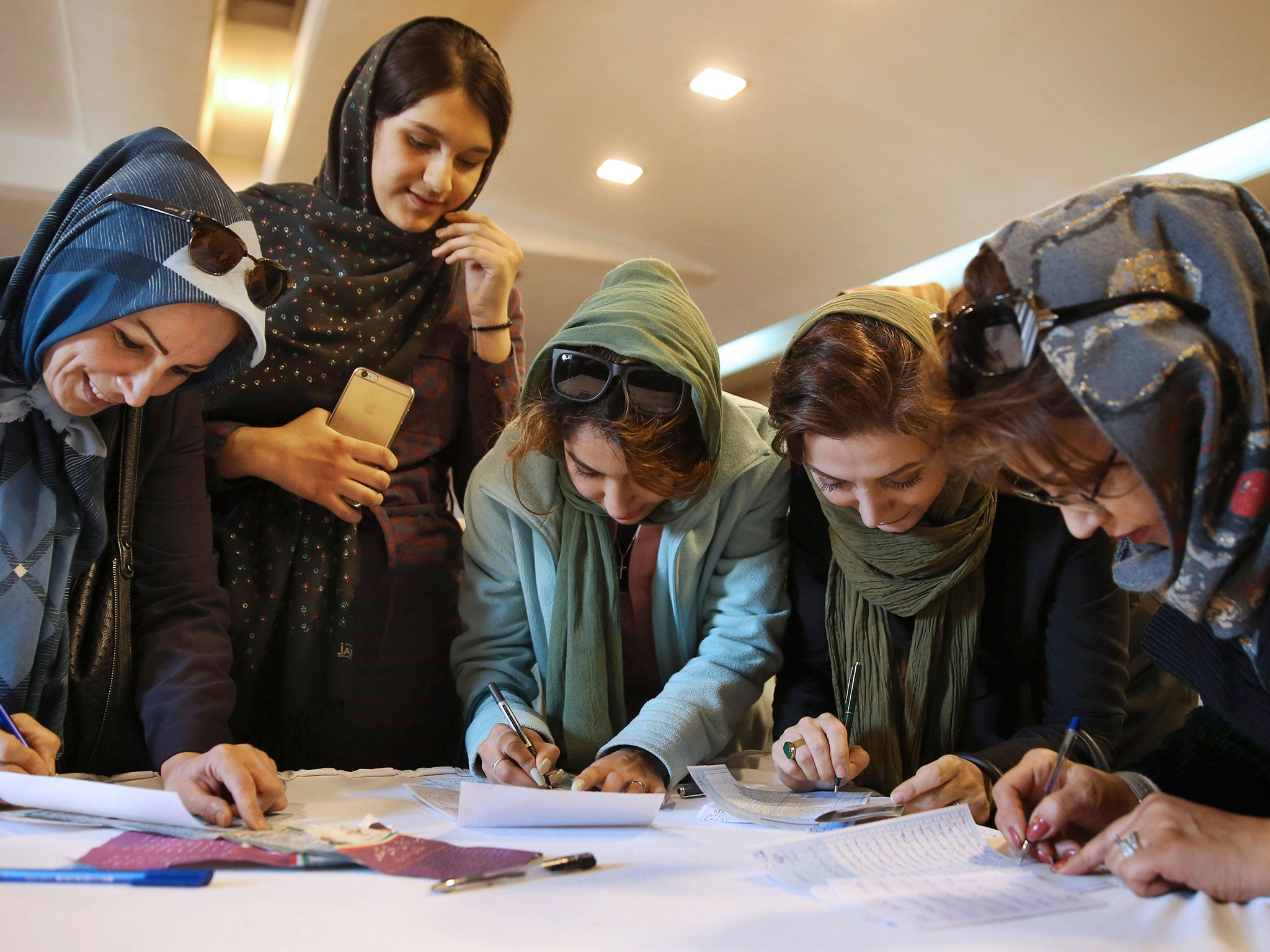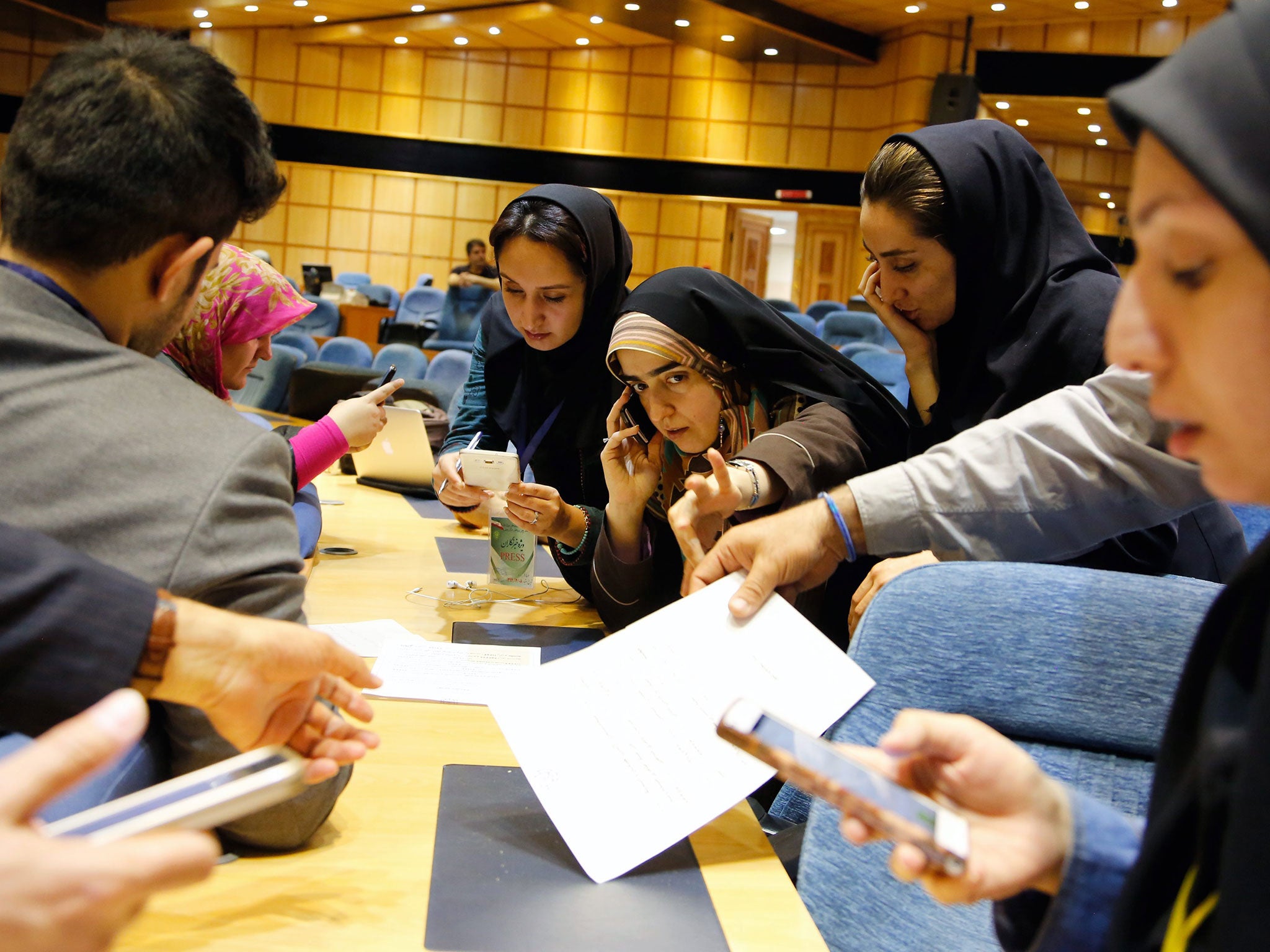Iran elections: Reformists triumph in Tehran to pave way for pivotal changes
Hardliners see many of their most senior leaders fall during a dramatic 24 hours in the nation's landmark elections

Your support helps us to tell the story
From reproductive rights to climate change to Big Tech, The Independent is on the ground when the story is developing. Whether it's investigating the financials of Elon Musk's pro-Trump PAC or producing our latest documentary, 'The A Word', which shines a light on the American women fighting for reproductive rights, we know how important it is to parse out the facts from the messaging.
At such a critical moment in US history, we need reporters on the ground. Your donation allows us to keep sending journalists to speak to both sides of the story.
The Independent is trusted by Americans across the entire political spectrum. And unlike many other quality news outlets, we choose not to lock Americans out of our reporting and analysis with paywalls. We believe quality journalism should be available to everyone, paid for by those who can afford it.
Your support makes all the difference.Landmark elections in Iran have resulted in sweeping gains for reformists and significant setbacks for hardliners, paving the way for pivotal changes for the country, both domestically and in its relations with the international community.
The sheer scale of the advance made by the List of Hope, backing the government of Hassan Rouhani, unfolded as more than 90 per cent of the votes were counted in the crucial battleground of Tehran. It had taken every single parliamentary seat in the capital and was in overall lead over its rivals nationwide.
The liberals also made unexpected progress in a second vote, which took place for the Assembly of Experts, a body traditionally dominated by hardliners and which appoints the Supreme Leader – the ultimate source of power in the Islamic Republic. Ayatollah Ali Khamenei, the current holder of the office, is 76 and is said to be ailing, meaning a successor may have to be chosen during the Assembly’s eight-year term.
What made the reformists’ triumph all the more remarkable was that the country’s Guardian Council, which vets candidates, had refused to let thousands of them run; among them was Hassan Khomeini, the grandson of Ayatollah Khomeini, the founder of the Islamic Republic. But after rejecting initial calls from some to boycott the polls, the reformists mobilised and formed alliances with moderate conservatives who had become alarmed by the aggressive rhetoric of hardliners.
The principalists, as the hardliners call themselves, saw many of their most senior leaders fall in a dramatic 24 hours, including, significantly, almost all the main opponents of President Rouhani’s nuclear deal with the world powers.
Foad Izadi, assistant professor of world studies at Tehran University, held that the nuclear agreement and economic benefits it offers was a deciding factor in voting. “It is a great victory in Tehran. It is beyond expectations,” he said. He pointed out, however, that “for other cities it is not yet so clear cut”. The elections were the first to be held since the nuclear agreement, which has led to the gradual lifting of international sanctions.

President Rouhani’s critics say the deal was a sell-out to the West and that foreign investment can turn into economic imperialism. They have been warning that the US and Britain will try to subvert the election results but Iranian voters appeared to have overwhelmingly endorsed Mr Rouhani’s policies. The President has promised drastic reforms in economic, legal and social fields in the future. This, it is believed, will range from addressing civil rights, including womens’ rights, although he is expected to proceed slowly on this due to clerical sensibilities. It is thought that there will also be cutting of red tape for business and tax reform.
Saeed Leylaz, a political analyst who was once an advisor to former President Mohammad Khatami, said: “It is a very big victory. It is very good news for President Rouhani. We will now have a very rational less factional, more expert, technocrat parliament.”
Mr Rouhani and Ayatollah Akbar Hashemi Rafsanjani, a former president who the reformists want as the next Supreme Leader, held the first two places among 28 candidates seeking the 16 seats of the Assembly in Tehran, with the following 14 places going to candidates from their list.
Reformist voters were adjusting to what had happened. “I am still finding it difficult to believe what is taking place. My friends and I have been texting each other to ask, ‘Is this real?’,” said Homa Soroush, 28, who works in the fashion industry. “This is fantastic but then we worry, ‘Are they going to try and take it away from us?’ It is best not to celebrate too soon.”
In the poll for the Majlis, Iran’s parliament, the head of the reformist coalition, Mohammed Reza Aref – who stood aside for Mr Rouhani in the 2013 presidential elections – was in first place with Ali Motahari, a former conservative MP and an outspoken critic of state abuse who had joined the reformists, coming in second.
Another conservative MP backing the reformists and President Rouhani was Ali Larijani, the influential Speaker of parliament, who came in second place in the centre of Shia theocracy, Qom. He had received an endorsement on the eve of the polls from Major General Qassem Suleimani, the head of the Quds Force of the Revolutionary Guards and the most powerful military figure in the country.
Three of the most prominent hardline leaders – Ayatollah Mohammed Yazdi, Ayatollah Mohammed Reza Kermani and Ayatollah Mohammed Mesbah-Yazdi – had asked Mr Larijani to join them against the common liberal enemy. He was quick to decline their invitation.
Ayatollah Yazdi and Ayatollah Mesbah-Yazdi have both failed to get into the Assembly of Experts. Gholam-Ali Haddad Adel, the principalist leader in Tehran, also lost, while Ahmad Jannati, the chairman of the Guardian Council that had carried out the purge of liberal candidates, made 15th place on a list of 16.
The rapid dissemination of the results, both officially and unofficially, was viewed as a tactical manoeuvre for what lay ahead. The Guardian Council will review the results and has the power to overturn them. Making the voting figures public at such an early stage, the reformists believe, will make their manipulation later more difficult.
The reformists currently hold just 20 seats in the 290-member Majlis, their influence having withered after the hardliner Mahmoud Ahmadinejad became president in 2005. His re-election four years later was marred by accusations of fraud, with many liberal voters abstaining. The subsequent development of Iran’s nuclear programme and aggressive rhetoric led to the country’s international isolation.
Even with the gains made, it is likely that the reformists would have to form an alliance with the moderate conservatives to get an overall majority. President Rouhani said that he would work with anyone in the Majlis who wanted to build a prosperous future.
He later tweeted: “With your skilful voting you’ve created a new atmosphere. In respect, I stand before you, great nation, who are the pride of the history of Iran.”
Subscribe to Independent Premium to bookmark this article
Want to bookmark your favourite articles and stories to read or reference later? Start your Independent Premium subscription today.
Join our commenting forum
Join thought-provoking conversations, follow other Independent readers and see their replies
Comments